
obsidian-systemsculpt-ai
Enhance your Obsidian App experience with AI-powered tools for note-taking, task management, and much, MUCH more.
Stars: 181
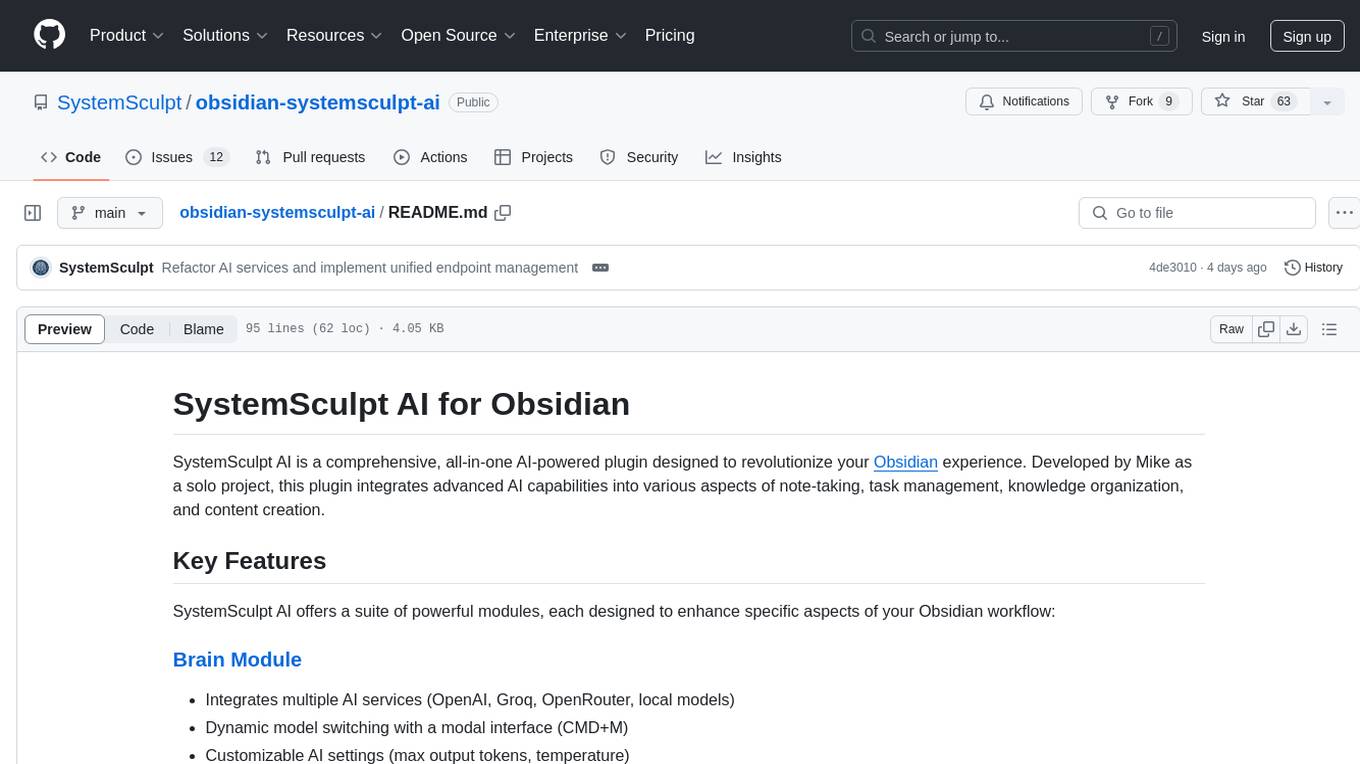
SystemSculpt AI is a comprehensive AI-powered plugin for Obsidian, integrating advanced AI capabilities into note-taking, task management, knowledge organization, and content creation. It offers modules for brain integration, chat conversations, audio recording and transcription, note templates, and task generation and management. Users can customize settings, utilize AI services like OpenAI and Groq, and access documentation for detailed guidance. The plugin prioritizes data privacy by storing sensitive information locally and offering the option to use local AI models for enhanced privacy.
README:
Turn your vault into an AI‑powered thinking partner. SystemSculpt brings fast, reliable chat, agent tools for your vault, semantic “Similar Notes,” rich context handling, and a refined Obsidian‑native experience on desktop and mobile.
-
Chat, your way
- Use OpenAI‑compatible providers (OpenAI, OpenRouter, MiniMax, Groq, local servers), Anthropic via adapter, or local models (LM Studio, Ollama)
- Streaming, reasoning blocks, mobile‑friendly UI
- Per‑chat model selection; saved chats to Markdown; chat history and resume
-
Context‑rich conversations
- Drag & drop notes; @‑mention files; paste large text smartly
- Paste or attach images; use any vision‑capable model your provider supports
- Clean rendering for code, tables, citations, and attachments
-
Agent Mode (MCP) with explicit approvals
- Built‑in vault tools exposed to the model with a one‑click safety approval flow
- Filesystem tools include:
read,write,edit,create_folders,list_items,move,trash - Search and context tools:
find,search(grep),open(tabs/panes),context(manage chat context)
-
Semantic “Similar Notes”
- Embeddings‑powered vector search across your vault
- “Similar Notes” panel that updates for the active file or chat
- Exclusions (folders/files), progress UI, and an embeddings status bar
- Bring your own embeddings endpoint/model (OpenAI‑compatible), or pick a provider in settings
-
Daily Vault automations
- Auto-create or remind daily notes with configurable templates and schedules
- Weekly review prompts and a live status bar with streak, weekly, and monthly activity
- Commands for opening/creating daily notes and running reviews
-
Models, prompts, templates, titles
- Unified model selection across providers; favorites and quick picks
- System prompt presets or custom prompts from your vault
- Template inserter for fast drafting
- One‑shot or automatic title generation for chats and notes
-
Web search integration
- Optional web search button in the chat toolbar when supported by the current provider
- Designed for OpenRouter and native provider endpoints that offer search plugins
-
Thoughtful details
- Polished Obsidian UI, optimized scrolling and rendering for long chats
- Touch‑friendly controls and responsive layout on mobile
- Clear errors with structured notices; handy debugging commands
- Open Settings → SystemSculpt AI → Overview & Setup
- Choose a provider (OpenAI, OpenRouter, MiniMax, Anthropic, LM Studio, Ollama, or any OpenAI‑compatible endpoint)
- Enter your endpoint and API key if required
- If you have a SystemSculpt license, the default SystemSculpt model is backed by OpenRouter
x-ai/grok-4.1-fast(vision-capable)
- Start a chat
- Command palette → “Open SystemSculpt Chat”, or click the ribbon icon
- Pick a model in the header; type and send
- Add context
- Drag notes in, @‑mention files, or click the paperclip to attach
- Use the “Chat with File” command from any note to open chat preloaded with that file
- Try Agent Mode (optional)
- Click the vault icon in the chat toolbar to toggle Agent Mode
- Approve or deny tool calls; everything is explicit and reversible
- Enable Similar Notes (optional)
- Settings → Embeddings & Search → Enable, then pick a provider
- If using a custom endpoint, set API endpoint + key + model (for example:
openrouter/openai/text-embedding-3-small) - Open the “Similar Notes” panel from the command palette or ribbon; embeddings process in the background as needed
- Power‑ups
- Templates: Command palette → “Open Template Selection”
- Titles: “Change/Generate Title” from a chat or any Markdown file
- Web search: Globe button in chat toolbar (when supported by the provider)
- Toolbar: Agent Mode toggle, per‑chat settings, attach/context, web search, microphone, send
- Context manager: add/remove files and include your vault’s structure when helpful
- Rendering: unified assistant message layout, code highlighting, citations, images
- History: save chats to Markdown, open chat history, resume from a history file
- Shortcuts: configurable hotkeys; streamlined keyboard navigation
- Open “Similar Notes Panel” from the command palette or ribbon
- Results update as you switch files or as the chat evolves
- Drag similar results into chat for instant context
- Exclude chat history or specific folders/files; respect Obsidian’s own exclusions
- Status UI shows progress, counts, and completion while building embeddings
Settings → Embeddings & Search lets you:
- Enable/disable embeddings
- Choose provider: SystemSculpt or Custom (OpenAI‑compatible)
- Configure endpoint, API key, and model when using a custom provider
- Scan for local services (Ollama, LM Studio) and apply in one click
When Agent Mode is on, the model can request tools that work inside your vault. You explicitly approve each call before it runs.
- Files:
read,write,edit,create_folders,move,trash - Listing and navigation:
list_items,open - Search:
find(by name),search(grep) - Context & analysis:
context(manage included files) - YouTube:
youtube_transcript(extract captions/transcript text)
All tools are scoped to your vault with built‑in content limits to keep the UI responsive.
- Overview & Setup: connect providers and API keys; activate license if you have one
- Models & Prompts: pick chat/title/post‑processing models; choose prompts; manage favorites
- Chat & Templates: chat defaults, agent mode defaults, template hotkeys
- Daily Vault: daily notes, templates, reminders, streaks, review flows
- Automations: configure and run workflow automations
- Embeddings & Search: enable embeddings, provider and model selection, exclusions, processing controls
- Audio & Transcription: microphone selection, transcription options, post‑processing
- Files & Backup: directories for attachments, recordings, chats, extractions; automatic backups and restore
- Data: imports and external sources (where enabled)
- Advanced: additional controls for power users
- Open SystemSculpt Chat
- Open SystemSculpt Chat History
- Chat with File (from the current note)
- Change Chat Model (current chat) / Set Default Chat Model
- Change/Generate Title
- Open Template Selection
- Open Similar Notes Panel
- Open SystemSculpt Search
- Open SystemSculpt AI Settings
- Open SystemSculpt Benchmark
Ribbon icons include Chat, Chat History, Janitor, Similar Notes, Search, Meeting Processor, and YouTube Canvas.
- Designed for mobile and desktop with responsive UI and touch-friendly controls
- Local-first: your vault stays on your device
- Your API keys talk directly to your chosen providers
- Works offline when using local models
- A shared
PlatformContextsingleton now powers every mobile/desktop branch. - Desktop defaults to native
fetch+ streaming; mobile pivots to ObsidianrequestUrlwith virtual SSE replay, and desktop falls back torequestUrlwhen streaming fails. - UI components emit
platform-ui-<variant>classes so styling and behavioral toggles stay in sync across chat, recorder, and transcription flows. - Clear, actionable errors and optional debug tools
- Open Obsidian Settings → Community Plugins
- Browse and search for “SystemSculpt AI”
- Click Install, then Enable
cd /path/to/vault/.obsidian/plugins/
git clone https://github.com/systemsculpt/obsidian-systemsculpt-ai systemsculpt-ai
cd systemsculpt-ai
npm install
npm run build📚 Research
Ask: “Summarize my notes on retrieval‑augmented generation and link the most similar notes.”
Use: drag notes + Similar Notes panel + agent tools for search and citations.
✍️ Writing
Ask: “Draft an outline for a blog post based on my productivity notes. Include citations.”
Use: attach context files + template inserter + title generator.
🖼️ Vision
Paste a diagram screenshot and ask questions using a vision‑capable model from your provider.
If you choose to add a license, you get:
- Document intelligence: PDF/Office → clean Markdown, with table and structure preservation
- Voice & audio intelligence: in‑app recording and robust transcription pipeline
- Unified SystemSculpt provider catalog for chat and embeddings
Learn more at https://systemsculpt.com/pricing.
MIT License – see LICENSE.
- Docs:
https://systemsculpt.com - Repo docs:
docs/README.md - Videos:
https://youtube.com/@SystemSculpt - Discord:
https://discord.gg/3gNUZJWxnJ - Email:
[email protected]
Built with ❤️ by Mike for the Obsidian community.
For Tasks:
Click tags to check more tools for each tasksFor Jobs:
Alternative AI tools for obsidian-systemsculpt-ai
Similar Open Source Tools

obsidian-systemsculpt-ai
SystemSculpt AI is a comprehensive AI-powered plugin for Obsidian, integrating advanced AI capabilities into note-taking, task management, knowledge organization, and content creation. It offers modules for brain integration, chat conversations, audio recording and transcription, note templates, and task generation and management. Users can customize settings, utilize AI services like OpenAI and Groq, and access documentation for detailed guidance. The plugin prioritizes data privacy by storing sensitive information locally and offering the option to use local AI models for enhanced privacy.
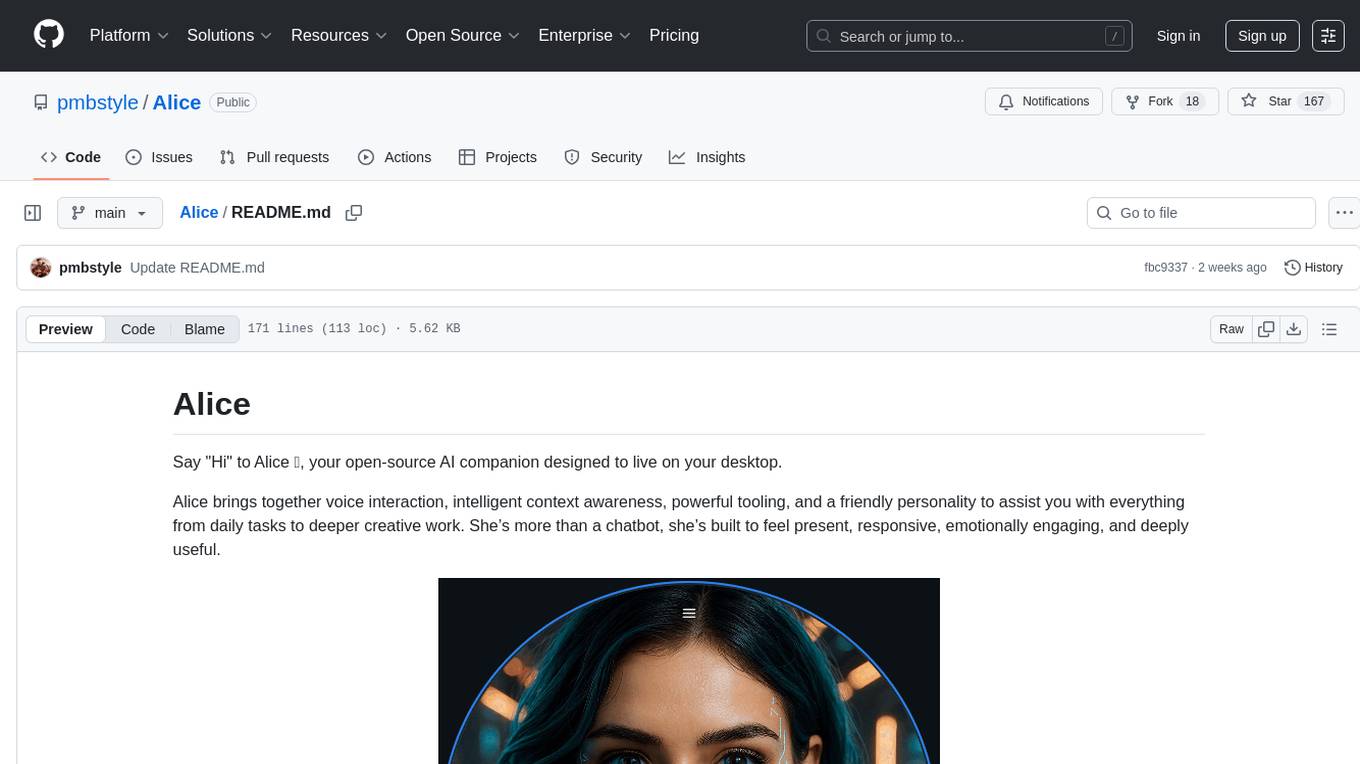
Alice
Alice is an open-source AI companion designed to live on your desktop, providing voice interaction, intelligent context awareness, and powerful tooling. More than a chatbot, Alice is emotionally engaging and deeply useful, assisting with daily tasks and creative work. Key features include voice interaction with natural-sounding responses, memory and context management, vision and visual output capabilities, computer use tools, function calling for web search and task scheduling, wake word support, dedicated Chrome extension, and flexible settings interface. Technologies used include Vue.js, Electron, OpenAI, Go, hnswlib-node, and more. Alice is customizable and offers a dedicated Chrome extension, wake word support, and various tools for computer use and productivity tasks.
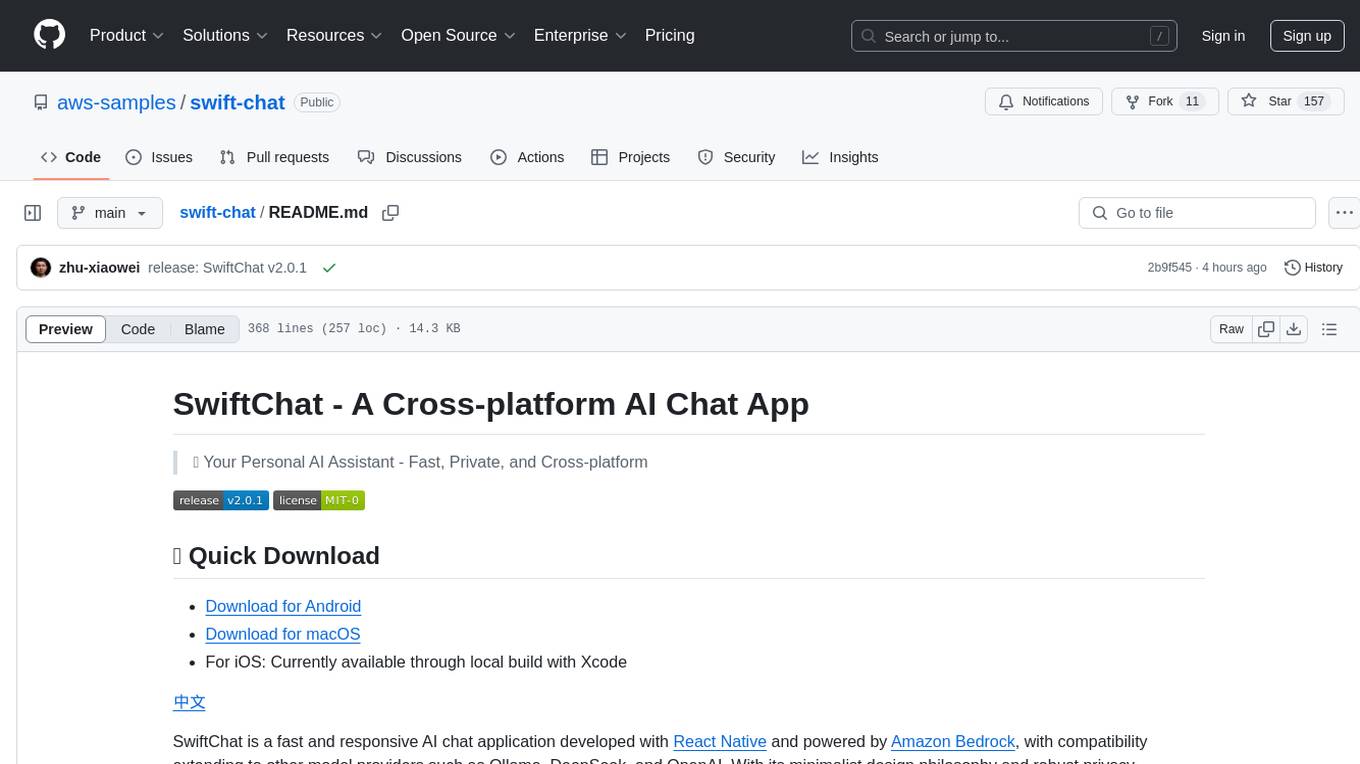
swift-chat
SwiftChat is a fast and responsive AI chat application developed with React Native and powered by Amazon Bedrock. It offers real-time streaming conversations, AI image generation, multimodal support, conversation history management, and cross-platform compatibility across Android, iOS, and macOS. The app supports multiple AI models like Amazon Bedrock, Ollama, DeepSeek, and OpenAI, and features a customizable system prompt assistant. With a minimalist design philosophy and robust privacy protection, SwiftChat delivers a seamless chat experience with various features like rich Markdown support, comprehensive multimodal analysis, creative image suite, and quick access tools. The app prioritizes speed in launch, request, render, and storage, ensuring a fast and efficient user experience. SwiftChat also emphasizes app privacy and security by encrypting API key storage, minimal permission requirements, local-only data storage, and a privacy-first approach.
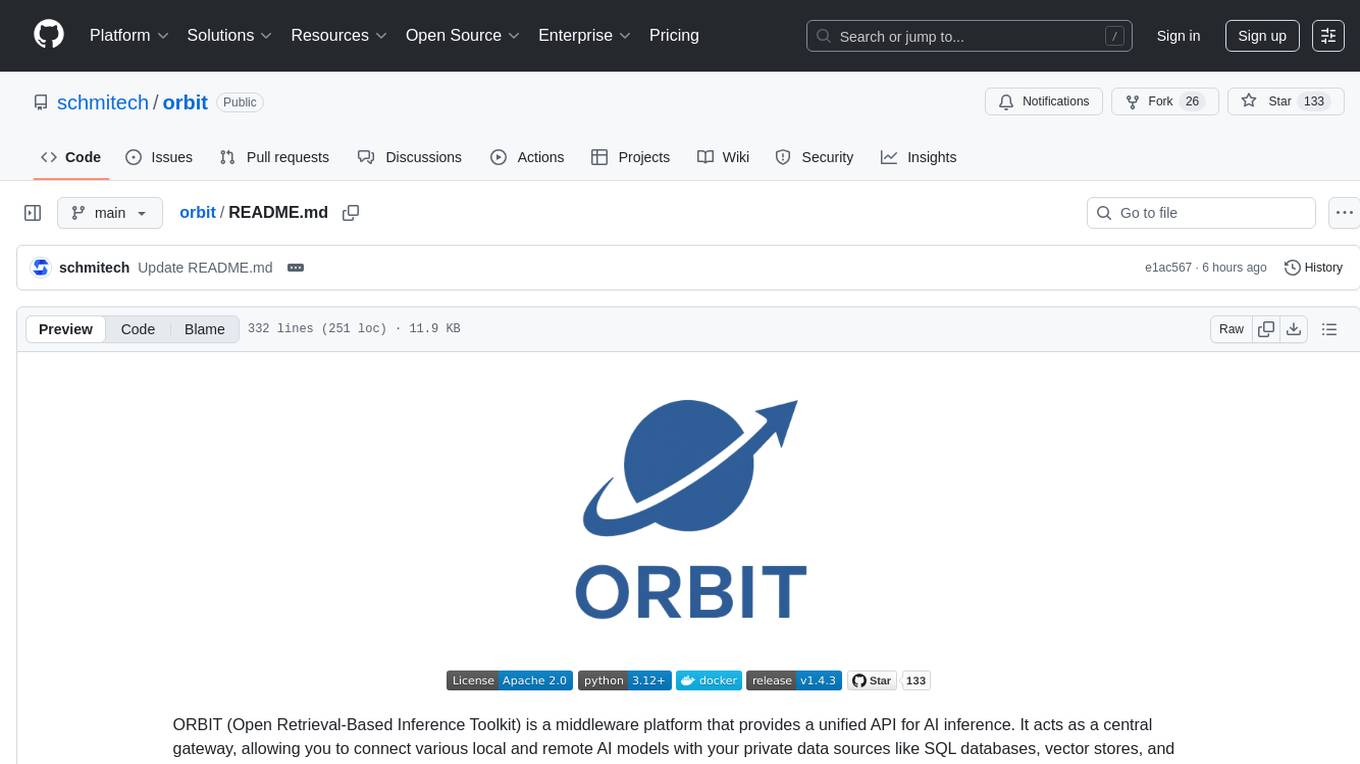
orbit
ORBIT (Open Retrieval-Based Inference Toolkit) is a middleware platform that provides a unified API for AI inference. It acts as a central gateway, allowing you to connect various local and remote AI models with your private data sources like SQL databases, vector stores, and local files. ORBIT uses a flexible adapter architecture to connect your data to AI models, creating specialized 'agents' for specific tasks. It supports scenarios like Knowledge Base Q&A and Chat with Your SQL Database, enabling users to interact with AI models seamlessly. The tool offers a RESTful API for programmatic access and includes features like authentication, API key management, system prompts, health monitoring, and file management. ORBIT is designed to streamline AI inference tasks and facilitate interactions between users and AI models.
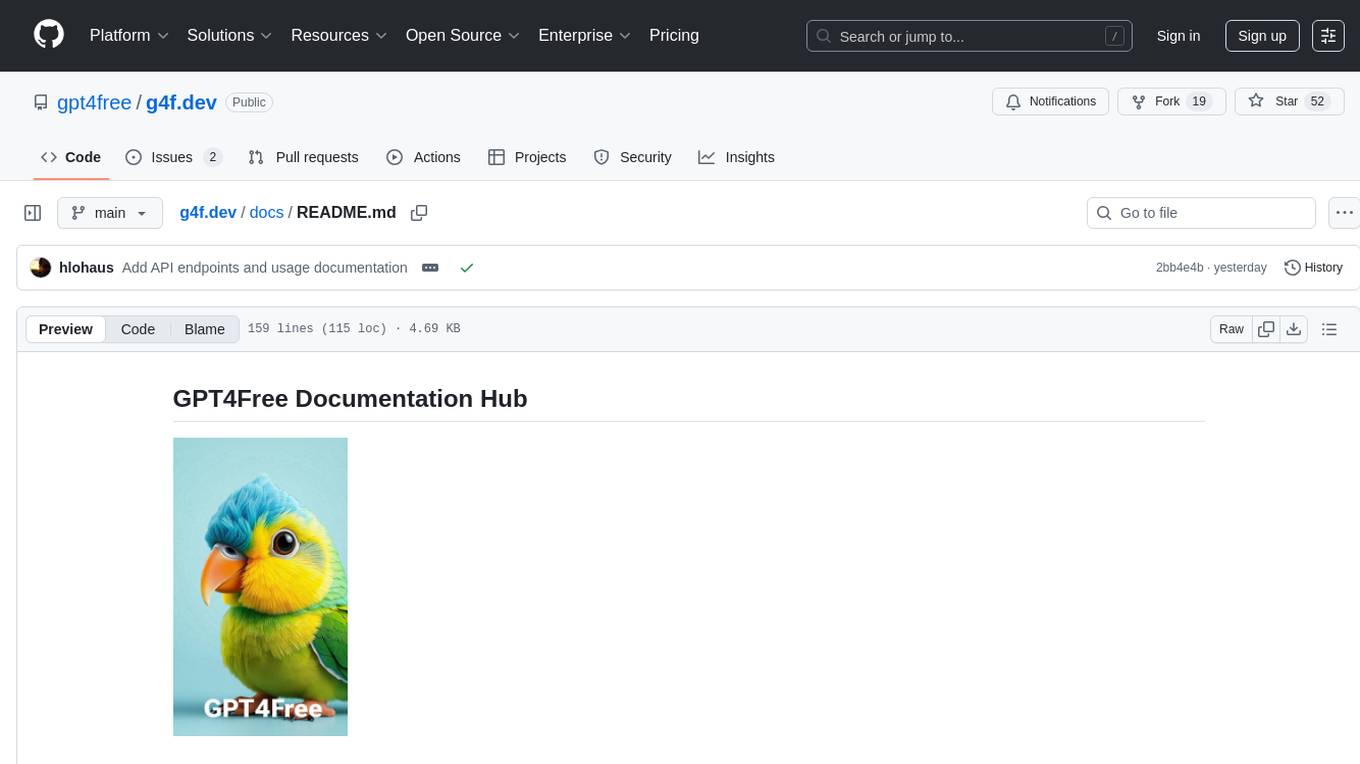
g4f.dev
G4f.dev is the official documentation hub for GPT4Free, a free and convenient AI tool with endpoints that can be integrated directly into apps, scripts, and web browsers. The documentation provides clear overviews, quick examples, and deeper insights into the major features of GPT4Free, including text and image generation. Users can choose between Python and JavaScript for installation and setup, and can access various API endpoints, providers, models, and client options for different tasks.

gptme
Personal AI assistant/agent in your terminal, with tools for using the terminal, running code, editing files, browsing the web, using vision, and more. A great coding agent that is general-purpose to assist in all kinds of knowledge work, from a simple but powerful CLI. An unconstrained local alternative to ChatGPT with 'Code Interpreter', Cursor Agent, etc. Not limited by lack of software, internet access, timeouts, or privacy concerns if using local models.
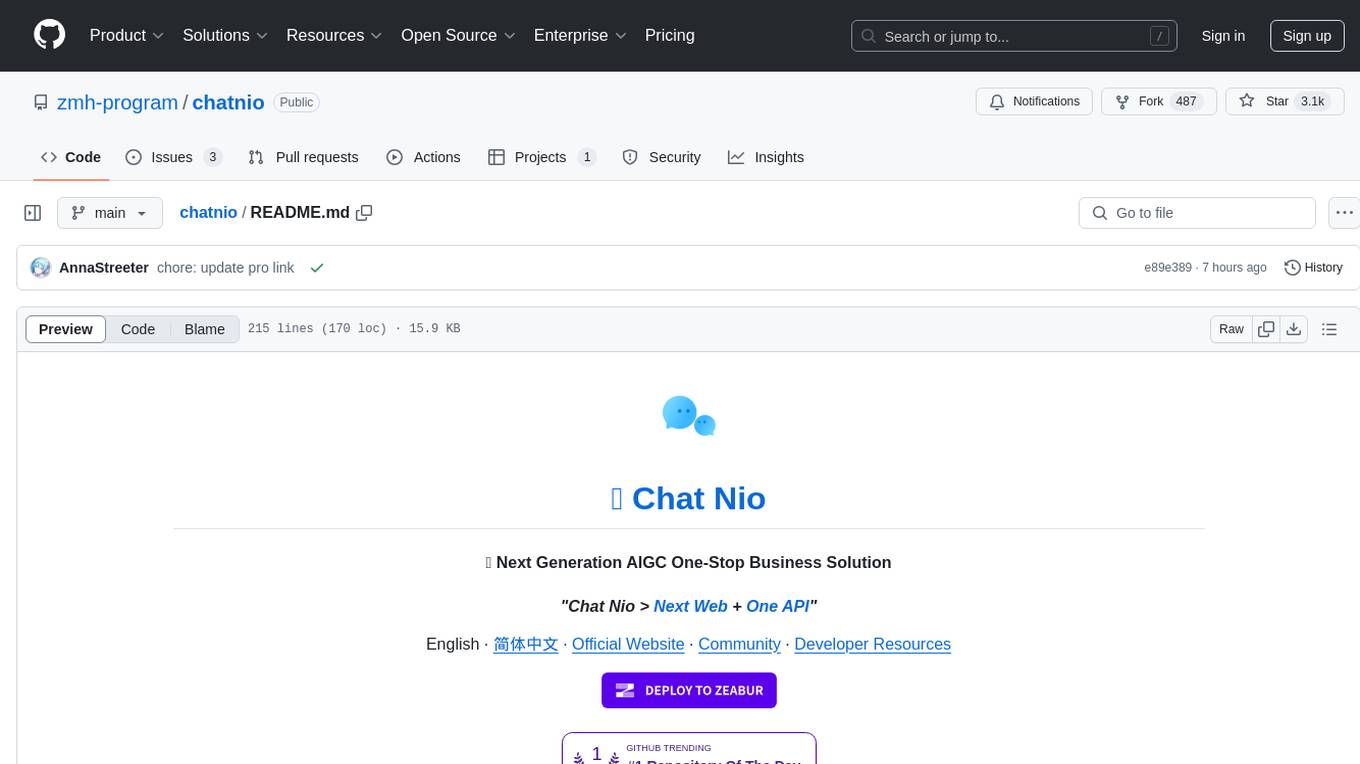
chatnio
Chat Nio is a next-generation AIGC one-stop business solution that combines the advantages of frontend-oriented lightweight deployment projects with powerful API distribution systems. It offers rich model support, beautiful UI design, complete Markdown support, multi-theme support, internationalization support, text-to-image support, powerful conversation sync, model market & preset system, rich file parsing, full model internet search, Progressive Web App (PWA) support, comprehensive backend management, multiple billing methods, innovative model caching, and additional features. The project aims to address limitations in conversation synchronization, billing, file parsing, conversation URL sharing, channel management, and API call support found in existing AIGC commercial sites, while also providing a user-friendly interface design and C-end features.
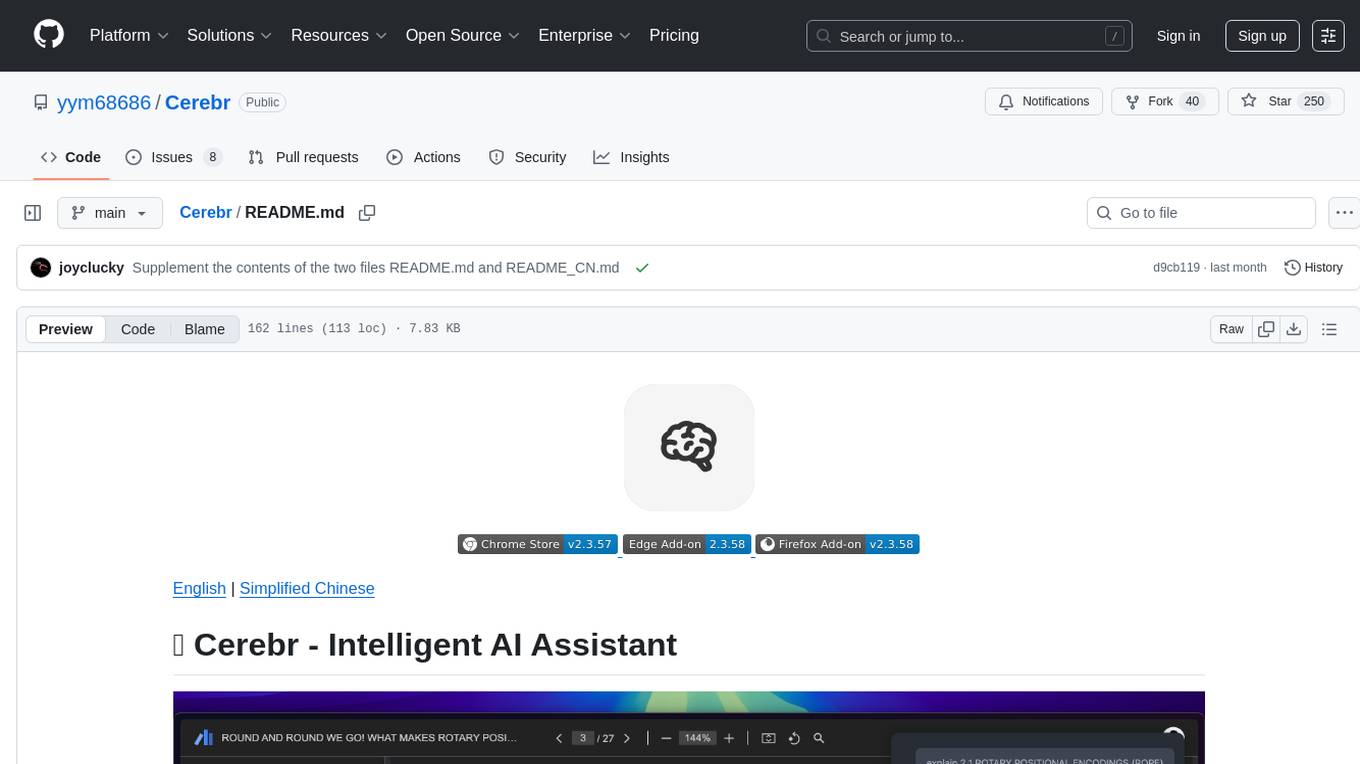
Cerebr
Cerebr is an intelligent AI assistant browser extension designed to enhance work efficiency and learning experience. It integrates powerful AI capabilities from various sources to provide features such as smart sidebar, multiple API support, cross-browser API configuration synchronization, comprehensive Q&A support, elegant rendering, real-time response, theme switching, and more. With a minimalist design and focus on delivering a seamless, distraction-free browsing experience, Cerebr aims to be your second brain for deep reading and understanding.
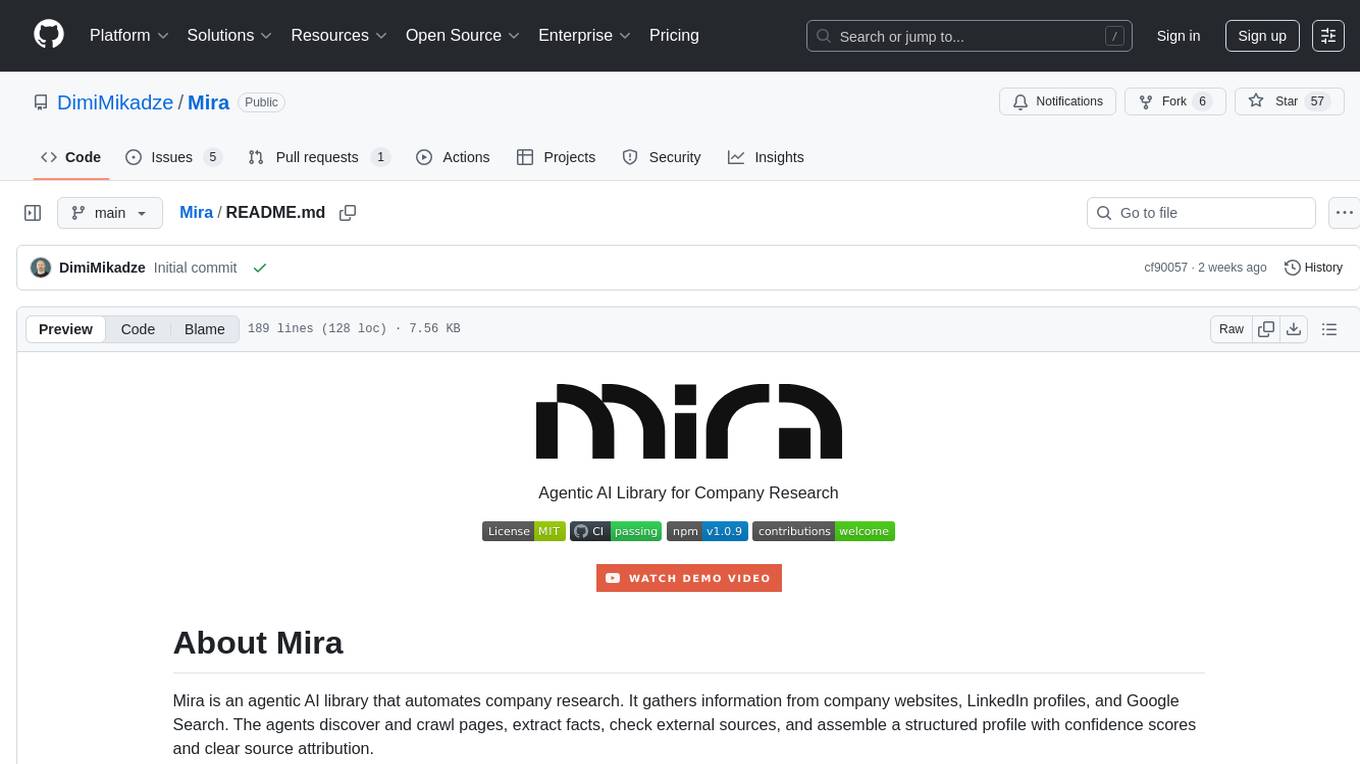
Mira
Mira is an agentic AI library designed for automating company research by gathering information from various sources like company websites, LinkedIn profiles, and Google Search. It utilizes a multi-agent architecture to collect and merge data points into a structured profile with confidence scores and clear source attribution. The core library is framework-agnostic and can be integrated into applications, pipelines, or custom workflows. Mira offers features such as real-time progress events, confidence scoring, company criteria matching, and built-in services for data gathering. The tool is suitable for users looking to streamline company research processes and enhance data collection efficiency.
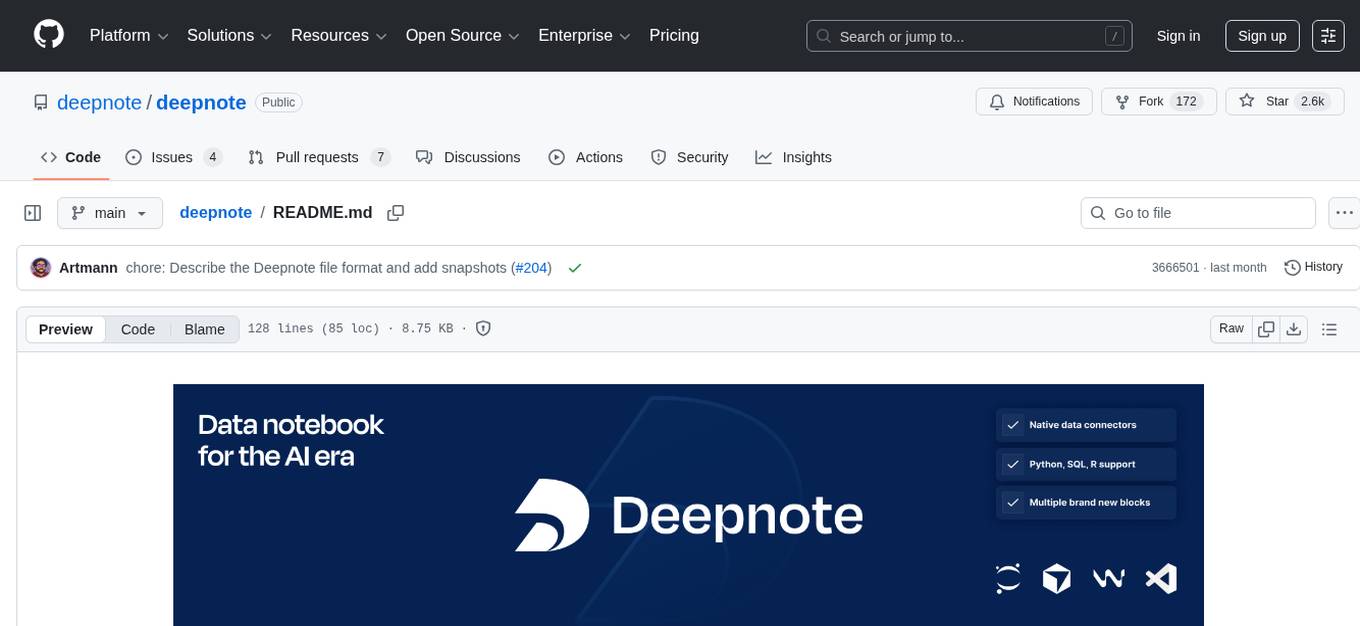
deepnote
Deepnote is a data notebook tool designed for the AI era, used by over 500,000 data professionals at companies like Estée Lauder, SoundCloud, Statsig, and Gusto. It offers a human-readable format, block-based architecture, reactive notebook execution, and effortless conversion between .ipynb and .deepnote formats. Deepnote extends Jupyter with features like native AI agent, Git integration, cloud compute, and native database & API connections. The repository contains reusable packages and libraries for Deepnote's notebook, runtime, and collaboration features.

TaskingAI
TaskingAI brings Firebase's simplicity to **AI-native app development**. The platform enables the creation of GPTs-like multi-tenant applications using a wide range of LLMs from various providers. It features distinct, modular functions such as Inference, Retrieval, Assistant, and Tool, seamlessly integrated to enhance the development process. TaskingAI’s cohesive design ensures an efficient, intelligent, and user-friendly experience in AI application development.
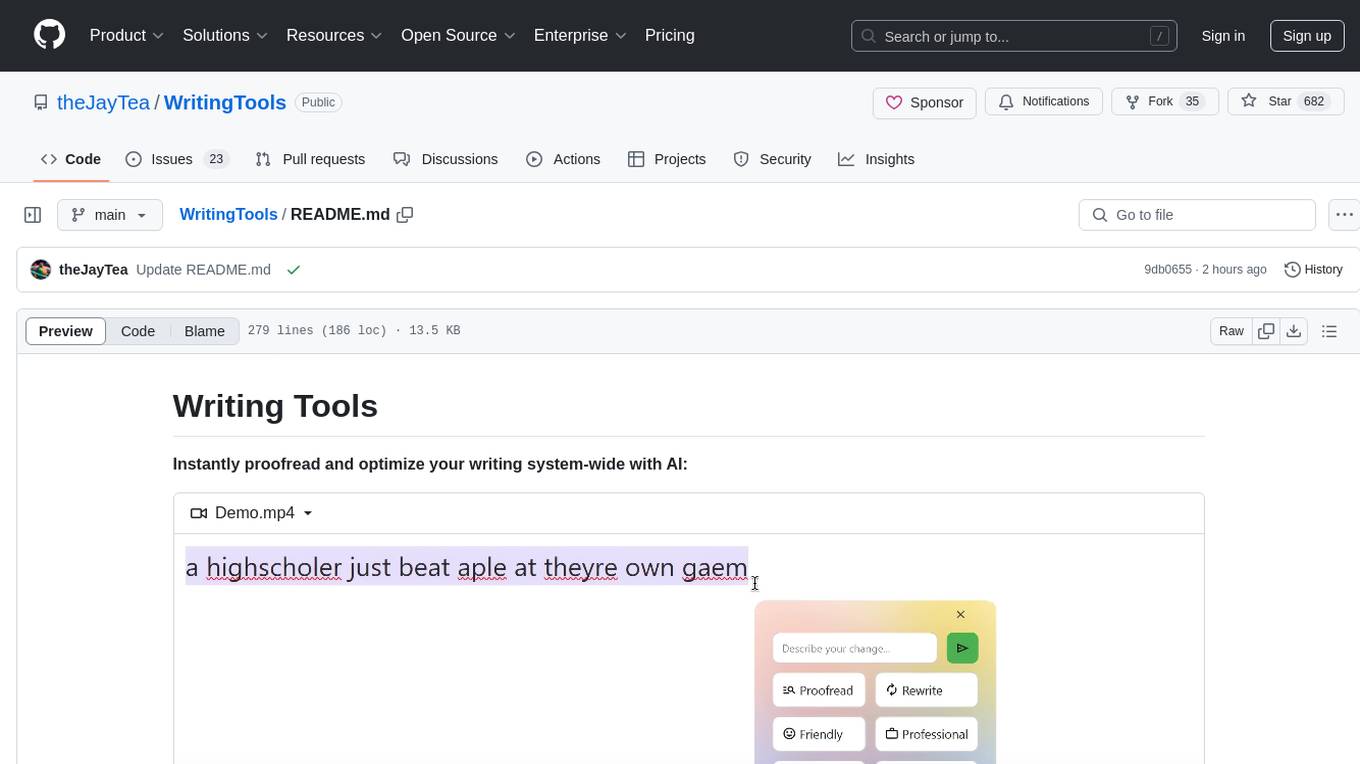
WritingTools
Writing Tools is an Apple Intelligence-inspired application for Windows, Linux, and macOS that supercharges your writing with an AI LLM. It allows users to instantly proofread, optimize text, and summarize content from webpages, YouTube videos, documents, etc. The tool is privacy-focused, open-source, and supports multiple languages. It offers powerful features like grammar correction, content summarization, and LLM chat mode, making it a versatile writing assistant for various tasks.

easydiffusion
Easy Diffusion 3.0 is a user-friendly tool for installing and using Stable Diffusion on your computer. It offers hassle-free installation, clutter-free UI, task queue, intelligent model detection, live preview, image modifiers, multiple prompts file, saving generated images, UI themes, searchable models dropdown, and supports various image generation tasks like 'Text to Image', 'Image to Image', and 'InPainting'. The tool also provides advanced features such as custom models, merge models, custom VAE models, multi-GPU support, auto-updater, developer console, and more. It is designed for both new users and advanced users looking for powerful AI image generation capabilities.
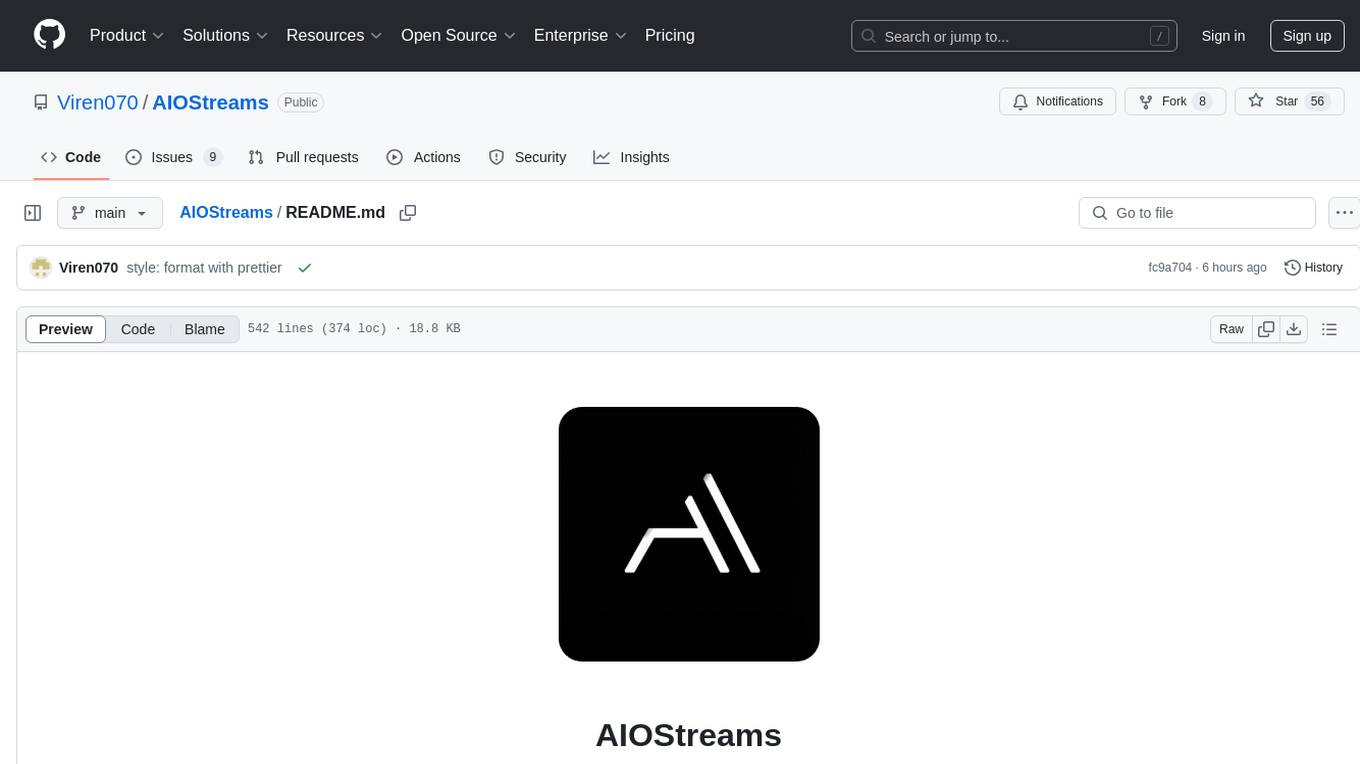
AIOStreams
AIOStreams is a versatile tool that combines streams from various addons into one platform, offering extensive customization options. Users can change result formats, filter results by various criteria, remove duplicates, prioritize services, sort results, specify size limits, and more. The tool scrapes results from selected addons, applies user configurations, and presents the results in a unified manner. It simplifies the process of finding and accessing desired content from multiple sources, enhancing user experience and efficiency.
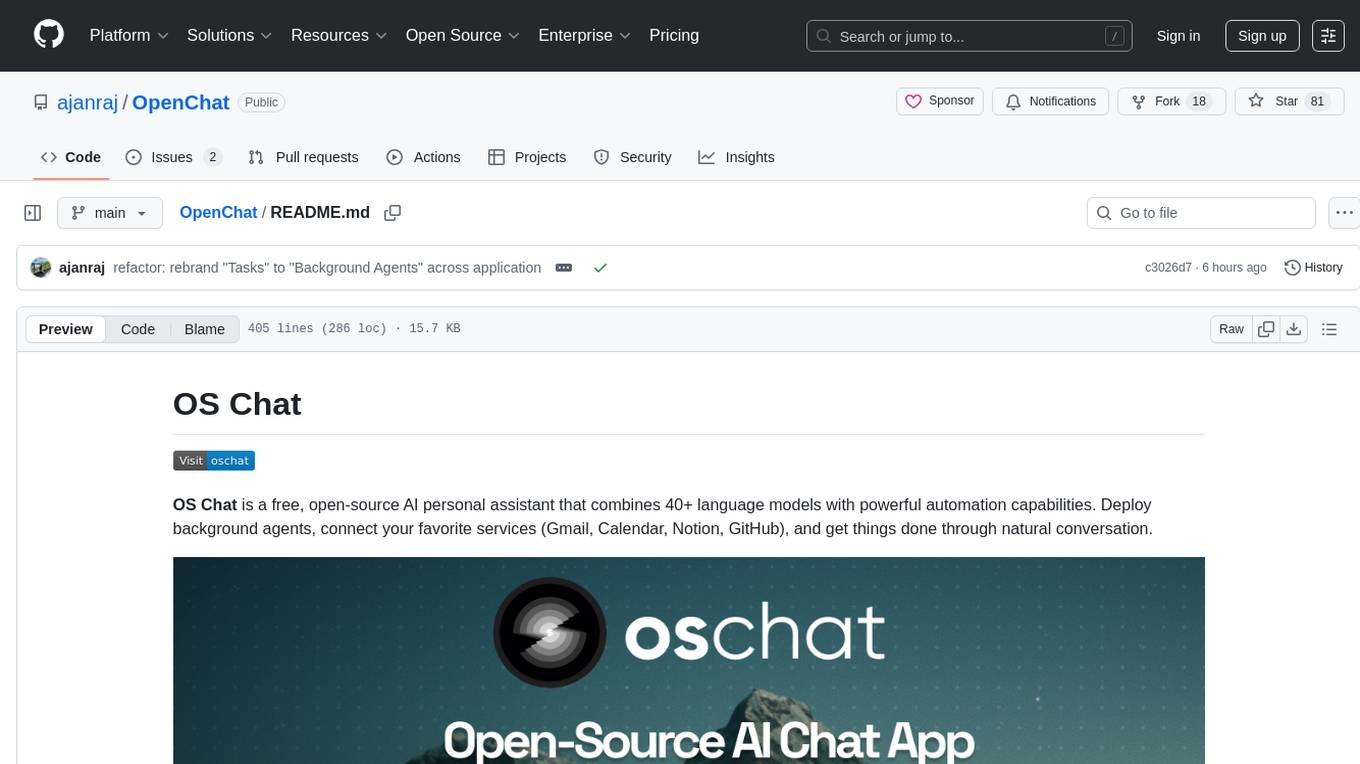
OpenChat
OS Chat is a free, open-source AI personal assistant that combines 40+ language models with powerful automation capabilities. It allows users to deploy background agents, connect services like Gmail, Calendar, Notion, GitHub, and Slack, and get things done through natural conversation. With features like smart automation, service connectors, AI models, chat management, interface customization, and premium features, OS Chat offers a comprehensive solution for managing digital life and workflows. It prioritizes privacy by being open source and self-hostable, with encrypted API key storage.
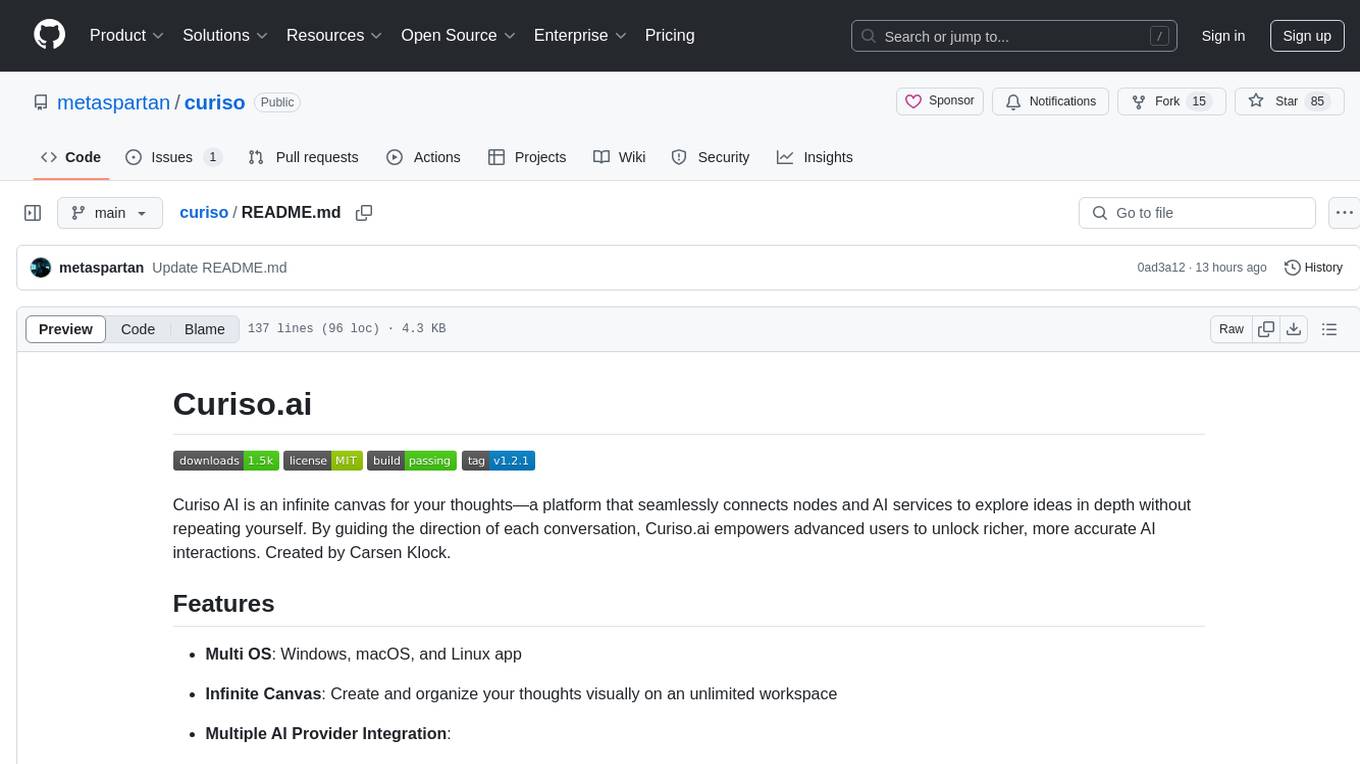
curiso
Curiso AI is an infinite canvas platform that connects nodes and AI services to explore ideas without repetition. It empowers advanced users to unlock richer AI interactions. Features include multi OS support, infinite canvas, multiple AI provider integration, local AI inference provider integration, custom model support, model metrics, RAG support, local Transformers.js embedding models, inference parameters customization, multiple boards, vision model support, customizable interface, node-based conversations, and secure local encrypted storage. Curiso also offers a Solana token for exclusive access to premium features and enhanced AI capabilities.
For similar tasks
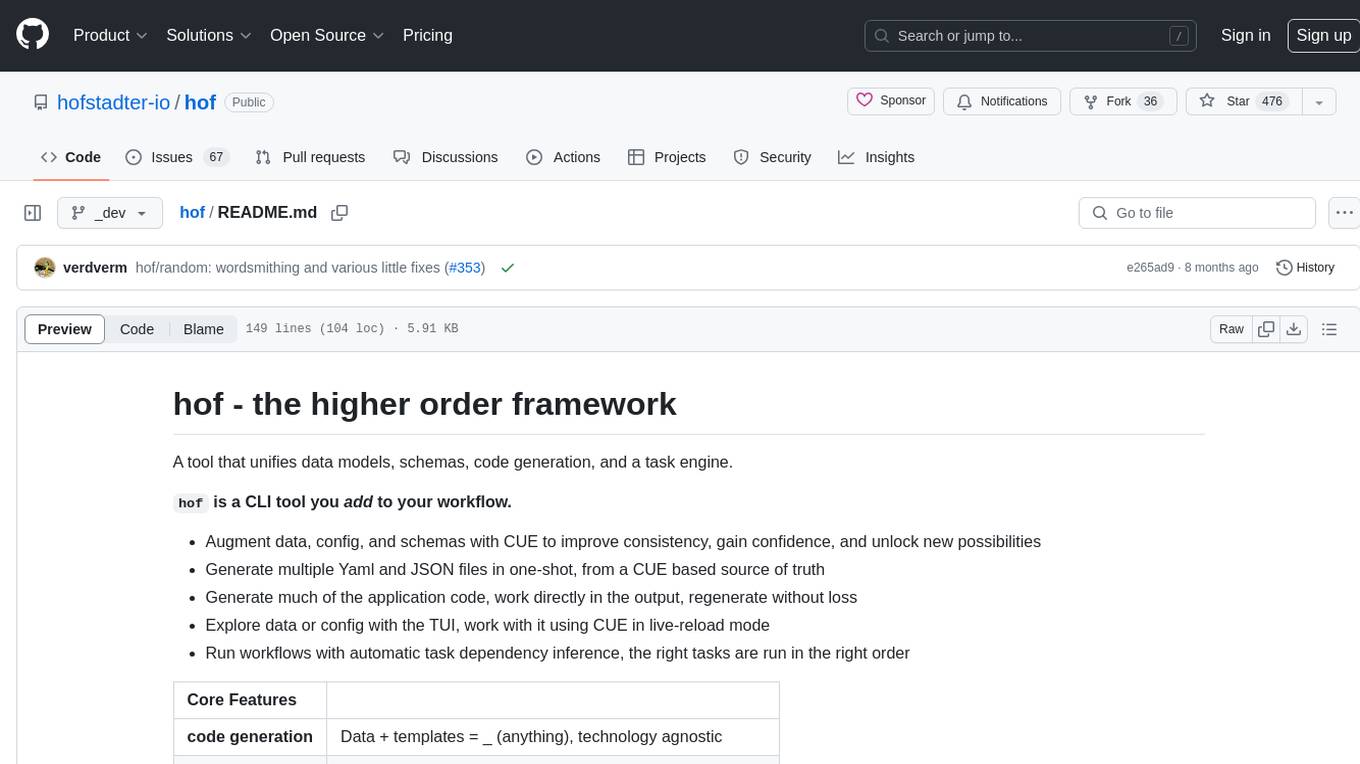
hof
Hof is a CLI tool that unifies data models, schemas, code generation, and a task engine. It allows users to augment data, config, and schemas with CUE to improve consistency, generate multiple Yaml and JSON files, explore data or config with a TUI, and run workflows with automatic task dependency inference. The tool uses CUE to power the DX and implementation, providing a language for specifying schemas, configuration, and writing declarative code. Hof offers core features like code generation, data model management, task engine, CUE cmds, creators, modules, TUI, and chat for better, scalable results.
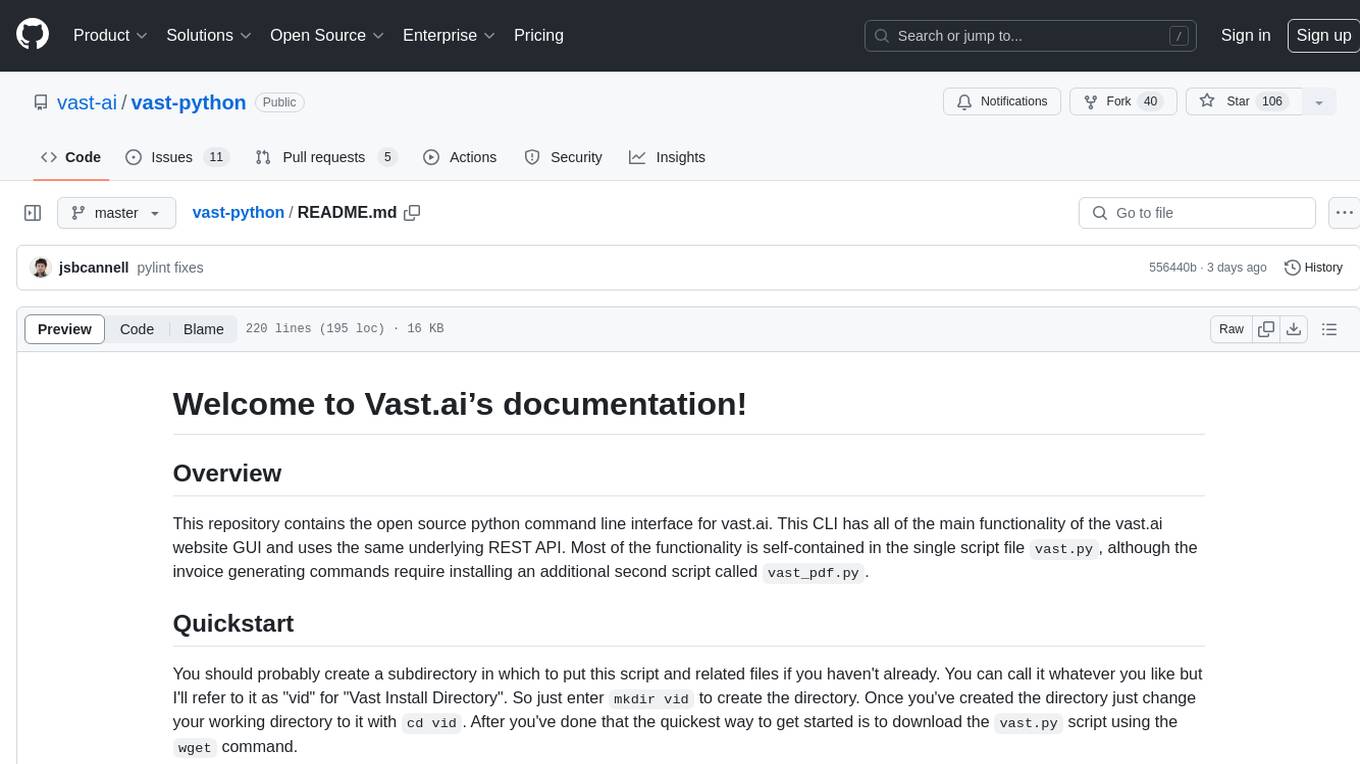
vast-python
This repository contains the open source python command line interface for vast.ai. The CLI has all the main functionality of the vast.ai website GUI and uses the same underlying REST API. The main functionality is self-contained in the script file vast.py, with additional invoice generating commands in vast_pdf.py. Users can interact with the vast.ai platform through the CLI to manage instances, create templates, manage teams, and perform various cloud-related tasks.

obsidian-systemsculpt-ai
SystemSculpt AI is a comprehensive AI-powered plugin for Obsidian, integrating advanced AI capabilities into note-taking, task management, knowledge organization, and content creation. It offers modules for brain integration, chat conversations, audio recording and transcription, note templates, and task generation and management. Users can customize settings, utilize AI services like OpenAI and Groq, and access documentation for detailed guidance. The plugin prioritizes data privacy by storing sensitive information locally and offering the option to use local AI models for enhanced privacy.
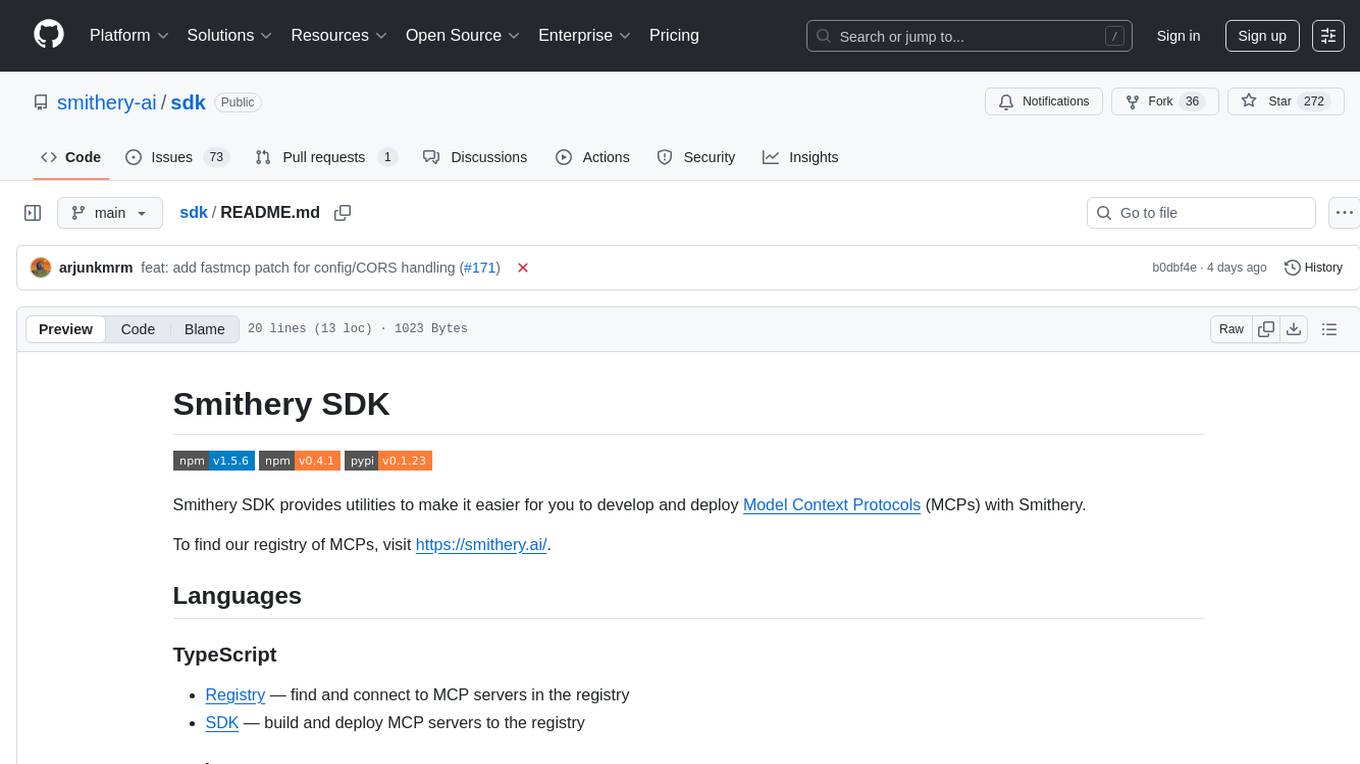
sdk
Smithery SDK is a tool that provides utilities to simplify the development and deployment of Model Context Protocols (MCPs) with Smithery. It offers functionalities for finding and connecting to MCP servers in the registry, building and deploying MCP servers, and creating fast MCP servers with Smithery session configuration support. Additionally, it includes a ready-to-use MCP server template. For more information and access to the MCP registry, visit https://smithery.ai/.
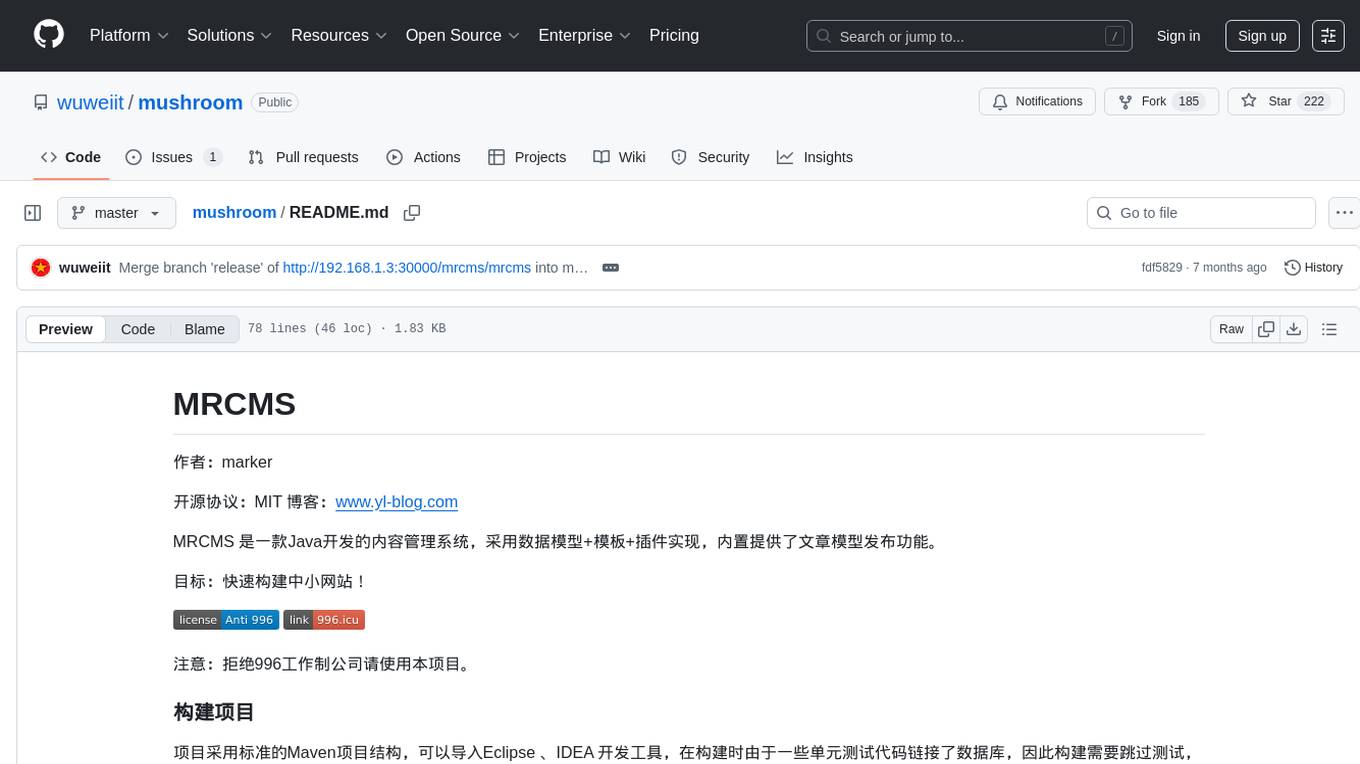
mushroom
MRCMS is a Java-based content management system that uses data model + template + plugin implementation, providing built-in article model publishing functionality. The goal is to quickly build small to medium websites.
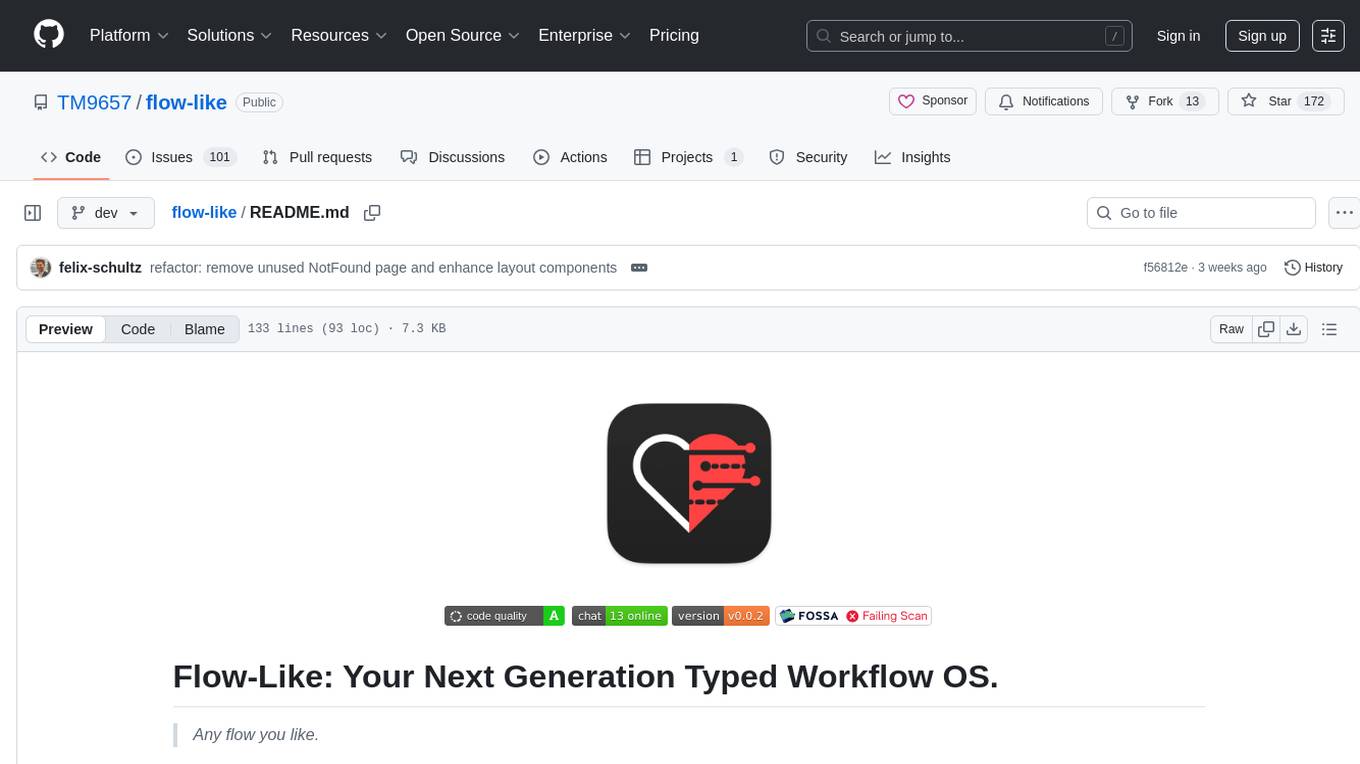
flow-like
Flow-Like is an enterprise-grade workflow operating system built upon Rust for uncompromising performance, efficiency, and code safety. It offers a modular frontend for apps, a rich set of events, a node catalog, a powerful no-code workflow IDE, and tools to manage teams, templates, and projects within organizations. With typed workflows, users can create complex, large-scale workflows with clear data origins, transformations, and contracts. Flow-Like is designed to automate any process through seamless integration of LLM, ML-based, and deterministic decision-making instances.
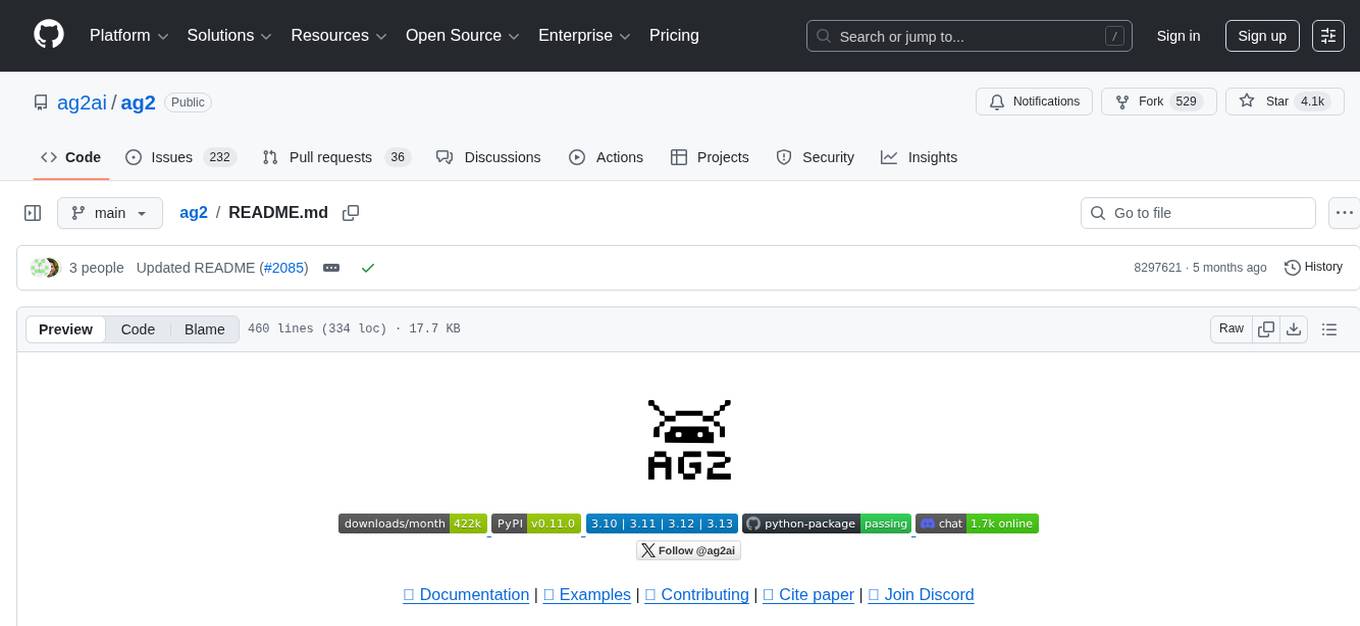
ag2
Ag2 is a lightweight and efficient tool for generating automated reports from data sources. It simplifies the process of creating reports by allowing users to define templates and automate the data extraction and formatting. With Ag2, users can easily generate reports in various formats such as PDF, Excel, and CSV, saving time and effort in manual report generation tasks.
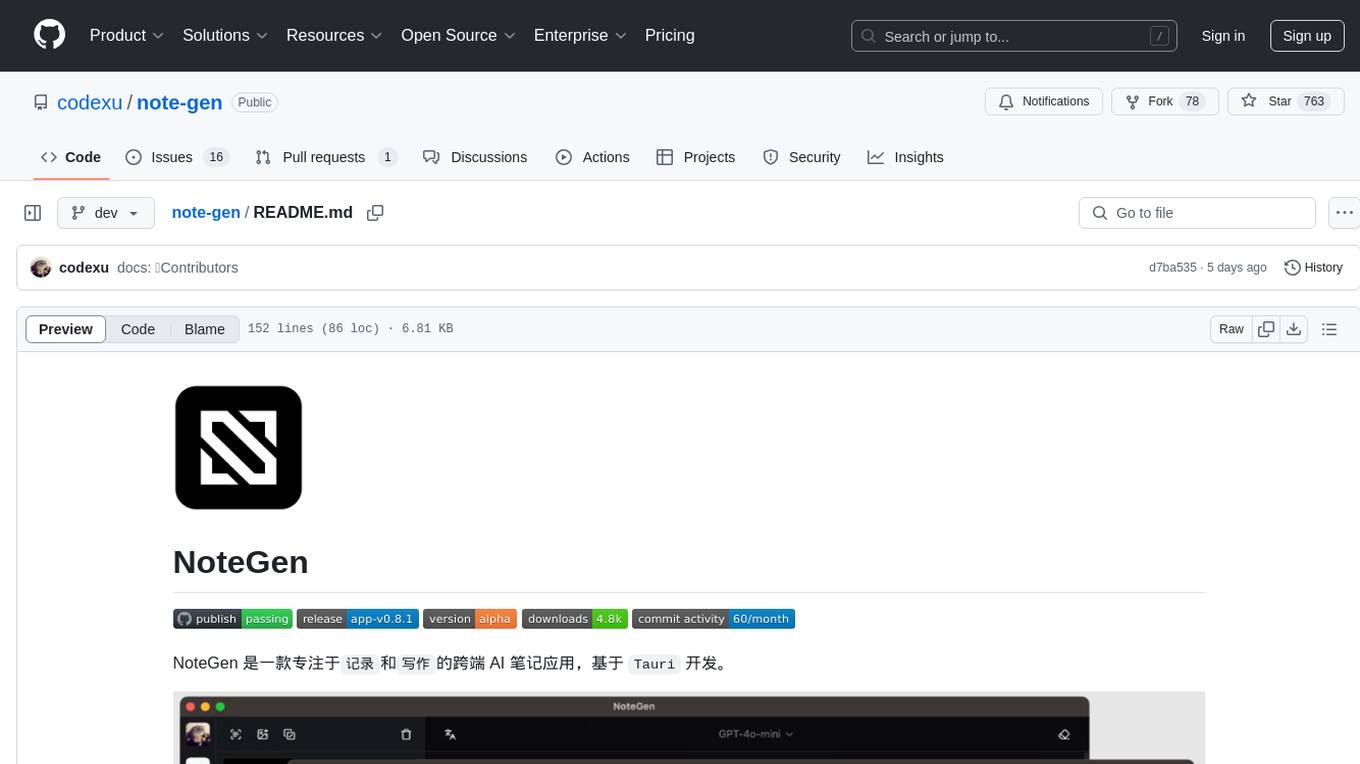
note-gen
Note-gen is a simple tool for generating notes automatically based on user input. It uses natural language processing techniques to analyze text and extract key information to create structured notes. The tool is designed to save time and effort for users who need to summarize large amounts of text or generate notes quickly. With note-gen, users can easily create organized and concise notes for study, research, or any other purpose.
For similar jobs

promptflow
**Prompt flow** is a suite of development tools designed to streamline the end-to-end development cycle of LLM-based AI applications, from ideation, prototyping, testing, evaluation to production deployment and monitoring. It makes prompt engineering much easier and enables you to build LLM apps with production quality.

deepeval
DeepEval is a simple-to-use, open-source LLM evaluation framework specialized for unit testing LLM outputs. It incorporates various metrics such as G-Eval, hallucination, answer relevancy, RAGAS, etc., and runs locally on your machine for evaluation. It provides a wide range of ready-to-use evaluation metrics, allows for creating custom metrics, integrates with any CI/CD environment, and enables benchmarking LLMs on popular benchmarks. DeepEval is designed for evaluating RAG and fine-tuning applications, helping users optimize hyperparameters, prevent prompt drifting, and transition from OpenAI to hosting their own Llama2 with confidence.

MegaDetector
MegaDetector is an AI model that identifies animals, people, and vehicles in camera trap images (which also makes it useful for eliminating blank images). This model is trained on several million images from a variety of ecosystems. MegaDetector is just one of many tools that aims to make conservation biologists more efficient with AI. If you want to learn about other ways to use AI to accelerate camera trap workflows, check out our of the field, affectionately titled "Everything I know about machine learning and camera traps".

leapfrogai
LeapfrogAI is a self-hosted AI platform designed to be deployed in air-gapped resource-constrained environments. It brings sophisticated AI solutions to these environments by hosting all the necessary components of an AI stack, including vector databases, model backends, API, and UI. LeapfrogAI's API closely matches that of OpenAI, allowing tools built for OpenAI/ChatGPT to function seamlessly with a LeapfrogAI backend. It provides several backends for various use cases, including llama-cpp-python, whisper, text-embeddings, and vllm. LeapfrogAI leverages Chainguard's apko to harden base python images, ensuring the latest supported Python versions are used by the other components of the stack. The LeapfrogAI SDK provides a standard set of protobuffs and python utilities for implementing backends and gRPC. LeapfrogAI offers UI options for common use-cases like chat, summarization, and transcription. It can be deployed and run locally via UDS and Kubernetes, built out using Zarf packages. LeapfrogAI is supported by a community of users and contributors, including Defense Unicorns, Beast Code, Chainguard, Exovera, Hypergiant, Pulze, SOSi, United States Navy, United States Air Force, and United States Space Force.

llava-docker
This Docker image for LLaVA (Large Language and Vision Assistant) provides a convenient way to run LLaVA locally or on RunPod. LLaVA is a powerful AI tool that combines natural language processing and computer vision capabilities. With this Docker image, you can easily access LLaVA's functionalities for various tasks, including image captioning, visual question answering, text summarization, and more. The image comes pre-installed with LLaVA v1.2.0, Torch 2.1.2, xformers 0.0.23.post1, and other necessary dependencies. You can customize the model used by setting the MODEL environment variable. The image also includes a Jupyter Lab environment for interactive development and exploration. Overall, this Docker image offers a comprehensive and user-friendly platform for leveraging LLaVA's capabilities.

carrot
The 'carrot' repository on GitHub provides a list of free and user-friendly ChatGPT mirror sites for easy access. The repository includes sponsored sites offering various GPT models and services. Users can find and share sites, report errors, and access stable and recommended sites for ChatGPT usage. The repository also includes a detailed list of ChatGPT sites, their features, and accessibility options, making it a valuable resource for ChatGPT users seeking free and unlimited GPT services.

TrustLLM
TrustLLM is a comprehensive study of trustworthiness in LLMs, including principles for different dimensions of trustworthiness, established benchmark, evaluation, and analysis of trustworthiness for mainstream LLMs, and discussion of open challenges and future directions. Specifically, we first propose a set of principles for trustworthy LLMs that span eight different dimensions. Based on these principles, we further establish a benchmark across six dimensions including truthfulness, safety, fairness, robustness, privacy, and machine ethics. We then present a study evaluating 16 mainstream LLMs in TrustLLM, consisting of over 30 datasets. The document explains how to use the trustllm python package to help you assess the performance of your LLM in trustworthiness more quickly. For more details about TrustLLM, please refer to project website.

AI-YinMei
AI-YinMei is an AI virtual anchor Vtuber development tool (N card version). It supports fastgpt knowledge base chat dialogue, a complete set of solutions for LLM large language models: [fastgpt] + [one-api] + [Xinference], supports docking bilibili live broadcast barrage reply and entering live broadcast welcome speech, supports Microsoft edge-tts speech synthesis, supports Bert-VITS2 speech synthesis, supports GPT-SoVITS speech synthesis, supports expression control Vtuber Studio, supports painting stable-diffusion-webui output OBS live broadcast room, supports painting picture pornography public-NSFW-y-distinguish, supports search and image search service duckduckgo (requires magic Internet access), supports image search service Baidu image search (no magic Internet access), supports AI reply chat box [html plug-in], supports AI singing Auto-Convert-Music, supports playlist [html plug-in], supports dancing function, supports expression video playback, supports head touching action, supports gift smashing action, supports singing automatic start dancing function, chat and singing automatic cycle swing action, supports multi scene switching, background music switching, day and night automatic switching scene, supports open singing and painting, let AI automatically judge the content.



